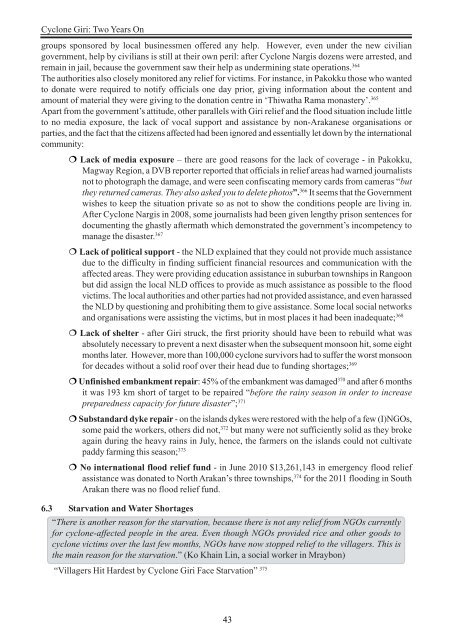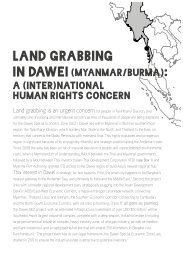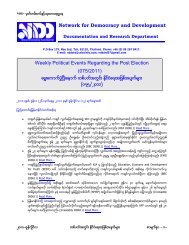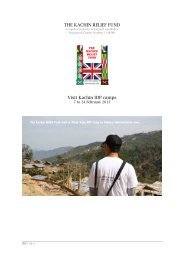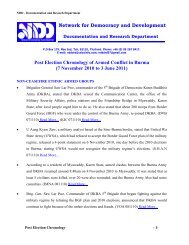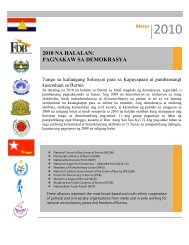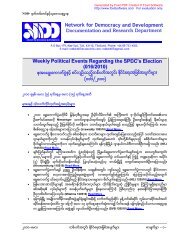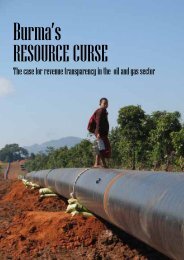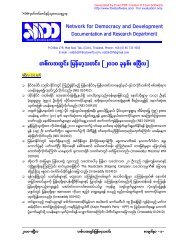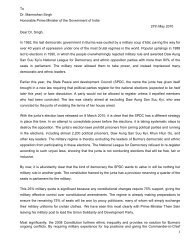Cyclone Giri - Two Years On - Burma Action Ireland
Cyclone Giri - Two Years On - Burma Action Ireland
Cyclone Giri - Two Years On - Burma Action Ireland
You also want an ePaper? Increase the reach of your titles
YUMPU automatically turns print PDFs into web optimized ePapers that Google loves.
<strong>Cyclone</strong> <strong>Giri</strong>: <strong>Two</strong> <strong>Years</strong> <strong>On</strong><br />
groups sponsored by local businessmen offered any help. However, even under the new civilian<br />
government, help by civilians is still at their own peril: after <strong>Cyclone</strong> Nargis dozens were arrested, and<br />
remain in jail, because the government saw their help as undermining state operations. 364<br />
The authorities also closely monitored any relief for victims. For instance, in Pakokku those who wanted<br />
to donate were required to notify officials one day prior, giving information about the content and<br />
amount of material they were giving to the donation centre in ‘Thiwatha Rama monastery’. 365<br />
Apart from the government’s attitude, other parallels with <strong>Giri</strong> relief and the flood situation include little<br />
to no media exposure, the lack of vocal support and assistance by non-Arakanese organisations or<br />
parties, and the fact that the citizens affected had been ignored and essentially let down by the international<br />
community:<br />
Lack of media exposure – there are good reasons for the lack of coverage - in Pakokku,<br />
Magway Region, a DVB reporter reported that officials in relief areas had warned journalists<br />
not to photograph the damage, and were seen confiscating memory cards from cameras “but<br />
they returned cameras. They also asked you to delete photos”. 366 It seems that the Government<br />
wishes to keep the situation private so as not to show the conditions people are living in.<br />
After <strong>Cyclone</strong> Nargis in 2008, some journalists had been given lengthy prison sentences for<br />
documenting the ghastly aftermath which demonstrated the government’s incompetency to<br />
manage the disaster. 367<br />
Lack of political support - the NLD explained that they could not provide much assistance<br />
due to the difficulty in finding sufficient financial resources and communication with the<br />
affected areas. They were providing education assistance in suburban townships in Rangoon<br />
but did assign the local NLD offices to provide as much assistance as possible to the flood<br />
victims. The local authorities and other parties had not provided assistance, and even harassed<br />
the NLD by questioning and prohibiting them to give assistance. Some local social networks<br />
and organisations were assisting the victims, but in most places it had been inadequate; 368<br />
Lack of shelter - after <strong>Giri</strong> struck, the first priority should have been to rebuild what was<br />
absolutely necessary to prevent a next disaster when the subsequent monsoon hit, some eight<br />
months later. However, more than 100,000 cyclone survivors had to suffer the worst monsoon<br />
for decades without a solid roof over their head due to funding shortages; 369<br />
Unfinished embankment repair: 45% of the embankment was damaged 370 and after 6 months<br />
it was 193 km short of target to be repaired “before the rainy season in order to increase<br />
preparedness capacity for future disaster”; 371<br />
Substandard dyke repair - on the islands dykes were restored with the help of a few (I)NGOs,<br />
some paid the workers, others did not, 372 but many were not sufficiently solid as they broke<br />
again during the heavy rains in July, hence, the farmers on the islands could not cultivate<br />
paddy farming this season; 373<br />
No international flood relief fund - in June 2010 $13,261,143 in emergency flood relief<br />
assistance was donated to North Arakan’s three townships, 374 for the 2011 flooding in South<br />
Arakan there was no flood relief fund.<br />
6.3 Starvation and Water Shortages<br />
“There is another reason for the starvation, because there is not any relief from NGOs currently<br />
for cyclone-affected people in the area. Even though NGOs provided rice and other goods to<br />
cyclone victims over the last few months, NGOs have now stopped relief to the villagers. This is<br />
the main reason for the starvation.” (Ko Khain Lin, a social worker in Mraybon)<br />
“Villagers Hit Hardest by <strong>Cyclone</strong> <strong>Giri</strong> Face Starvation” 375<br />
43


